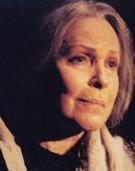SEARCH CurtainUp
REVIEWS
FEATURES
NEWS
Etcetera and
Short Term Listings
LISTINGS
Broadway
Off-Broadway
BOOKS and CDs
OTHER PLACES
Berkshires
London
LA/San Diego
DC
Philadelphia
Elsewhere
QUOTES
On TKTS
LETTERS TO EDITOR
FILM
LINKS
MISCELANEOUS
Free Updates
Masthead
NYC Weather
 London Review
London Review
Whistling Psyche
by Andrea Lopaz
|
A person tells stories because he doesn't want the waves of silence to kill him.
--- Dr Barry |

Claire Bloom as Florence Nightingale
(Photo: John Haynes) |
The set, dim lighting, and sound create a mysterious and promising atmosphere. There is a lit up fireplace, a mirror mantelpiece, misty background and haunting sounds of dogs, owls, and trains. To support certain revelatory scenes, there are projections of waves and other figures on the backdrop, in the mist. This design is extremely evocative. The simultaneously cavernous and ephemeral set reflects the dynamics of the play . The writing is mired in exposition, uncovering the histories of these two important figures. And yet, sometimes, the play becomes more mysterious, released by moments of contact between characters or with the audience, and transported by evocative poetic language.
The two character dramatic setup seems to be a device to explore the character of Dr JM (James Miranda) Barry. Although lesser known than Florence Nightingale, he was seminal in the organization of British (and colonial) hospitals and the treatment of the insane. Born in Ireland, Barry was a precocious child --. biologically female and forced, at the age thirteen, to become a man to the outside world in order to study and make money.
Kathryn Hunter portrays Dr. Barry very convincingly and with an extreme amount of compassion. As Miss Nightingale says of Dr. Barry, "This is a strange, singular, weirdly irreducible person." Dr. Barry's life story evokes the British Empire at its height and is full of compelling tales. However, there is so little movement or change in dynamic on stage, and the tales are told at such an even pace, that the play becomes increasingly less engaging.
Interestingly enough, Barry and Nightingale did meet each other once during the Crimean War. Barry was a military medical inspector, and when he met the famous Miss Nightingale, he attacked her with jealousy and rage about something minor. Miss Nightingale represented a terrifying possibility to Dr Barry: that it is possible to live in the male world without fully sacrificing identity and gender. The play fully explores this anger, as well as the liminal place in society which Dr Barry, and less so, Miss Nightingale ,were forced to occupy. Claire Bloom is very compelling and presents a lyrical performance as Miss Nightingale, disturbed and ultimately moved by her companion.
Director Robert Delamere treats the script with great care for the rich language. However, this limits the play and robs it of a sense of urgency. Stuck in this situation reminiscent of Sartre's No Exit, and Beckett, we long for contact between the characters. While waiting, the attention wanders. However, when the characters do relate, there are transcendent moments onstage.
| Whistling Psyche
Written by Sebastian Barry Directed by Robert Delamere Starring: Kathryn Hunter, Claire Bloom Designer: Simon Higlett Lighting Designer: Tim Mitchell Sound: John Leonard Music: Ross Lorraine Running time: One hour forty minutes without an interval Box Office: 020 7359 4404 Booking to 19th June 2004. Reviewed by Andrea Lopaz based on 18th May 2004 performance at the Almeida, Almeida Street, London N1 (Tube: Angel, Islington) |


Mendes at the Donmar
Our Review

Peter Ackroyd's History of London: The Biography

London Sketchbook

Retold by Tina Packer of Shakespeare & Co. Click image to buy.
Our Review

6, 500 Comparative Phrases including 800 Shakespearean Metaphors by CurtainUp's editor.
Click image to buy.
Go here for details and larger image.
